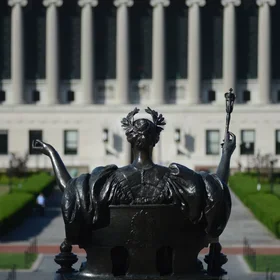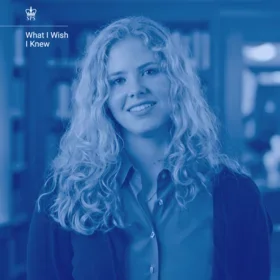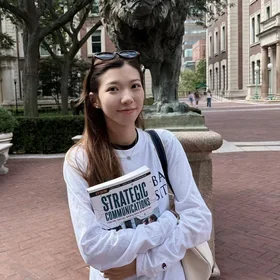For more than seven weeks, Valentina Giagnoni ('20SPS, Executive M.S. in Strategic Communication), Head of Group Internal Communications – Identity & Communication at UniCredit, has been leading the Group’s strategic internal communications, operating from the epicenter in one of the areas in the world that has been most affected by the COVID-19 pandemic: Milan, Italy.
Valentina joined the UniCredit Group, a simple successful Pan-European commercial bank, with a fully plugged-in Corporate & Investment Banking, delivering a unique Western, Central and Eastern European network to its extensive and growing client franchise, last year.
“As a professional, it has been my responsibility to explain what was happening to employees of the organization I work for,” Valentina says. “One of the greatest challenges in all of this has been to try to understand and then explain the complete unknown to a population that is continuously seeking more information. I can say that on both fronts, I’ve truly lived this experience to its fullest extent.”
Valentina joined Columbia University School of Professional Studies in 2019 as a student in the Executive M.S. in Strategic Communication and expects to graduate in December 2020.
We caught up with her to learn more about how she’s weathered the crisis in Italy and what lessons she might have to share with the rest of the world:
How has your work interlaced with the ongoing crisis in Italy?
Just like anyone else, my work has been impacted by COVID-19 in terms of embracing and adopting a new way of working, from physically going to my workplace every day and managing my team in-person, to doing it remotely through various digital channels. Working from home can be challenging, especially in when doing so over an extended period of time and in particular in relation to the normal Italian working culture – which is still very traditional in terms of in-person work environments.
In light of COVID-19, remote working became a necessity, with our local government and businesses having to understand how to best enable and empower team members to continue to work and contribute to the nation’s economy.
What drew you to the Executive M.S. in Strategic Communication program?
I decided to enroll in this program for three main reasons: the access to incredible resources only an Ivy League University can grant, an international-driven curriculum, and the top-notch faculty and innovative approach towards strategic communications topics as a whole.
The idea of individualism and nationalism is over. This crisis is teaching us to better collaborate, share, and made us aware of how interdependent we are with one-another and with the world around us.
— Valentina Giagnoni, '20SPS, Executive M.S. in Strategic Communication
What advice do you have for others leading communications during this time?
Always strive to exhibit qualities of transparency, clarity and…some boldness. In moments of uncertainty, the best thing that communicators – and leaders – can do is use plain language to provide a clear understanding of what’s going on, even if that means communicating unpleasant or difficult decisions.
In my opinion, to communicate decisively, being able to transparently deliver news, offering accurate and timely information, showing your human side (“we’re in this together” spirit) are all aspects at the heart of what communications leaders should always practice and especially in this moment.
Overall, as one of my mentors has said more than once, from all of this, “we should learn how to be able to navigate this new world with greater serenity, audacity and common sense.”
What are the best practices you've developed for managing a communications team on the forefront of this crisis during this unprecedented period?
a. Ethics. Since the moment we as a company realized this crisis was about to “explode”, we proactively prepared a communication and engagement plan to keep our teams well-informed, engaged and most importantly, give them a sense of security and reassurance. Our CEO asked us to do everything we could to reaffirm that the safety of our people was our absolute top priority, above and beyond the business. It has always been the case but, in such a moment, it was important to reiterate it as people were struggling to adjust to a “new normal”. This was the Right Thing to Do (as we say at UniCredit) and underpins the ethical approach we apply to the way we do our everyday business.
b. Collectiveness versus individualism. The idea of a “one-man show” is over. This crisis is teaching us to collaborate, share, be open and inquisitive with one-another and the world around us.
c. Daring. We decided that this was the ideal moment to experiment with a new way of reaching our audiences and speaking to our diverse populations so we launched a new platform – a true digital hub, fully dedicated to how the bank is responding to the challenges of COVID-19. The objective of the microsite (one.unicreditgroup.com) was to create ONE virtual place where all of our 80,000+ employees could remain informed about the situation and its development while simultaneously feel at home and at ease in the midst of the unknown. In addition to pragmatic tips on Health & Safety, in the spirit of UniCredit’s passion for continuous people well-being and care, we shared ideas as to how to explain to both their children and loved ones what’s going on in the world, ways to remain resilient, to embrace the situation and how to stay productive and positive in self-isolation. We also engaged people through some non-work-related activities, such as inviting them to join a spring photo contest and asking them to share in what creative ways they’ve stayed in touch with their closest connections in ways they did not or could not do before.
d. Recognition. More than ever before, it is of the utmost importance to recognize the efforts that all team members in the Company are doing to ensure business continuity while living through this unprecedented and historical moment – a situation which well out of everyone’s comfort zone!
e. Responsibility in providing substance over form! I believe this goes way beyond managing a communications team on the forefront of this crisis. It is best practice and lesson learned after having experienced this COVID-19 situation: social and environmental responsibility. Going forward, we all have to work to find business projects that are born in total conjunction with respect for everything around us.
What is your hope for the future?
My hope for the future is that we won’t wait for another crisis, pandemic or virus to reflect on the impact we all have on our planet and the responsibility we owe to future generations. My hope is that we will learn from all that we have experienced during this unprecedented time in terms of digital opportunities, creativity, disruptiveness, work-life balance, capability to live with less and still be optimistic. Most importantly, that we will unlearn and relearn to rethink everything from scratch, to redesign business models, processes, educational systems, home-working practices, access to culture and entertainment to name a few…until we are happy with the “new path forward”. It is not about a new recovery program (we can do it!) but reimagining a new future (not so easy to do it!).
My hope is that we will learn from all that we have experienced during this unprecedented time in terms of digital opportunities, creativity, disruptiveness, capability to live with less and still be optimistic.
— Valentina Giagnoni, '20SPS, Executive M.S. in Strategic Communication
We must be capable of recognizing that whatever “new reality” many of us have experienced it was nothing compared to what people with no home or someone to share this moment with have felt; that we are all “social animals” and social distancing will be the first and last consequence we will have to cope with; that we remind ourselves of who was on the “real” front line more than anyone else (our doctors, healthcare workers, volunteers, civil protection).
Last but not least, I hope I will be able to tell an honest story to my daughter when she’s older, without downplaying what happened, what we saw and learned. Sharing with her that the reason we overcame this crisis was because we superseded nationalism and made our economy, our culture, our everyday habits and respect for the environment and society as a whole, a bit more sustainable and ethical than they are today.
Valentina Giagnoni is a student in the Executive M.S. in Strategic Communication program. You can learn more about that program here.


